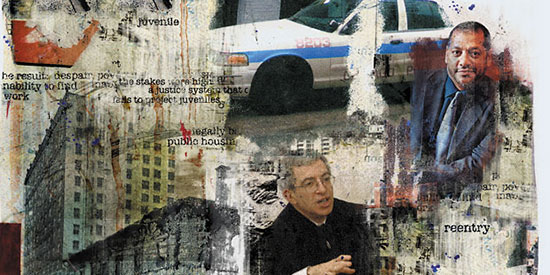Not just saving lives, but assuring quality of life for those in need.
Life and death struggles naturally gain a lot of attention, and NYU’s renowned capital defender clinics are no exception. But the death penalty plays a part in only a tiny fraction of criminal-court dockets. Students and faculty involved in NYU’s nine other criminal fieldwork clinics provide a public service to their local communities by serving poor and disadvantaged individuals whose struggles have a profound effect on the quality of their lives.
Take Professor of Clinical Law Anthony Thompson, whose Offender Reentry Clinic introduces students to the post-incarceration consequences of criminal convictions. The clinic—the first of its kind in the nation—is at the cutting edge of public-interest law, creatively expanding advocacy to bring resources and compassion to bear on an urgent public need. Restrictions such as the inability to find work, or being legally barred from public housing, can effectively prevent an offender’s reentry into society. The result: despair, poverty and recidivism. As many as half of all individuals leaving prison are homeless upon release, and an estimated two-thirds of former prisoners who do not have appropriate housing commit crimes within the first 12 months of release. “We often hear that when you’ve done your time, you’ve paid your debt to society,” says Thompson. “But people who are coming out of prison are just beginning to pay their debt.”

Students in the Offender Reentry Clinic work with the Center for Employment Opportunity (CEO), a New York-based nonprofit agency, counseling former inmates who are denied employment or lose their jobs because of prior convictions. Child support enforcement presents difficulties for many ex-inmates, since support accrues while inmates are in jail; many of them cannot meet their financial responsibilities upon release. Tamzin Kinnebrew ’07 encountered one man who had amassed $10,000 in child support debt while he was in jail. She helped him through legal procedures to reduce the amount of his child support payments due to changes in circumstances: “Many clients didn’t have resources or the understanding of the system that was necessary to address that kind of issue.”
Thompson also teaches students to explore other forms of advocacy, such as promoting legislative change and media advocacy. For example, students learn to write op-ed pieces and to lobby reporters and editorial boards to publish stories about reentry. Thompson has invited newspaper editors to speak to his classes on how stories are placed. Students have also drafted proposed legislation to reinstate Pell-type grants for educational and vocational opportunities in New York State prisons. Congress abolished Pell grants for inmate higher education in the early 1990s.
For clinic students, accepting the responsibility of representing actual people in real need of legal advocacy provides many sobering lessons. Randy Hertz, director of Clinical and Advocacy Programs and professor of clinical law,directs the Juvenile Defender Clinic. Students act as defense counsel in juvenile delinquency proceedings in New York Family Court. Hertz works with Legal Aid Society Juvenile Rights Division staff attorneys to supervise clinic participants.
The exposure to practice is immediate. Just weeks after the clinic began, Jason Washington ’07 appeared in court for arraignments. He later argued a rare motion in the furtherance of justice, which defense attorneys rely on to argue that there’s no reason to proceed with a trial because justice won’t be served by going to court. The case involved a domestic dispute between a 15-year-old girl and her mother. The girl admitted striking her mother, but Washington argued that the two were still living together eight months later and that the girl and the mother could better resolve their differences through counseling. The case was dismissed even though, as the judge later told Washington, most attorneys wouldn’t have filed the motion because the chances of success were slim. “I was able to file the motion because of the backing and resources of the clinic,” says Washington. “I was taught that you have to do absolutely everything possible to help your client.”